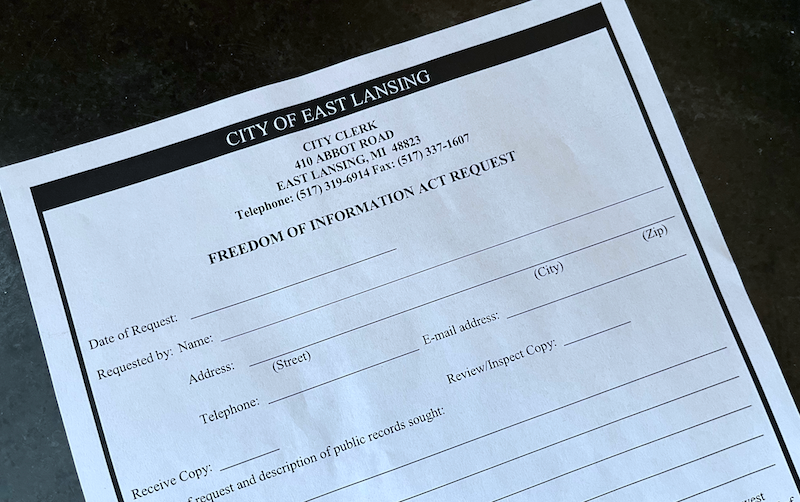Take Your Public Records Requests to the Next Level
If you’re not using FOIAs to bring local news, you’re probably missing out on great reporting opportunities. Already using it? We’ve got tips on how to turn your public records game pro.

By Alice Dreger
True story: In an apparent effort to shame us over how many Freedom of Information Act (FOIA) requests my news operation in East Lansing, Michigan, was filing, our city manager ordered the city clerk to start publishing a log of all public records requests.
We immediately made lemonade. First, we used this uncharacteristic burst of transparency to find out from the log what other people were seeking. (That was amazing.) Then we used it to fundraise with our readers. (“No one searches the records for you like we do!”)
To be clear, we were not filing frivolous requests, nor should you. In the words of Tom Hayden who runs the cleverly named “FOIA Gras” newsletter in Evanston, Illinois, “Your local FOIA officer is regularly bombarded with FOIA requests from partisan groups fishing for stories. Remember that this is a tool for transparency and governance, not a tool to own your enemies or go after private individuals working for some government agency you disagree with politically.”
In our case, the reason we were filing “so many” requests was that our city manager was making it very hard to access “public” records.
But even if your local government behaves well in terms of transparency, it’s still a good idea to keep FOIA in mind as an important reporting tool. This post provides FOIA possibilities you may not have considered.
Make your first FOIA in a potential series really smart. Someone who’s never been FOIA’ed before won’t have started moving sensitive conversations from emails and texts to phone calls and private meetings. So, make that first request really worth it.
My son’s first FOIA was of his high school principal’s correspondence regarding a wave of censorship of the student newspaper. Because the principal had never been FOIA’ed before, he had no idea what he shouldn't have put in writing. Long story short: the FOIA response rated three chili peppers, the censorship ceased, and the principal took another job.
By the way, don’t make the rookie mistake of asking the wrong agency for what you want. Don’t ask the county for the city’s parking ticket revenue, for example.
Make time every week for FOIA. I learned this at a FOIA workshop hosted by LION Publishers – that making time every week to check on the status of responses to your request means you’re not losing track of what you’re due. Setting aside time each week also means you’ll remember to file requests you might otherwise put off longer than you should. It means you’ll remember every week to be asking your reporters what the team ought to be asking to get. It keeps the tool sharp.
FOIA the mundane. Ask for the town’s checkbook registers (to know who's getting paid how much for what), the county attorney’s itemized billing records (to see what legal issues are in the works), the city manager’s calendar (who is she meeting with?), and so on. It’s amazing how many leads you’ll pick up from these seemingly rote records.
Use records to get records. As Tom noted when I asked him for his string of FOIA pearls, “Governments publish a lot of records publicly during board meetings, public presentations, and speeches. Use these records to learn about other records.”
A brief reference at a city council meeting to a piece of public property being sold at auction was how I discovered that the City of East Lansing had auctioned off a million-dollar plot of land on eBay after notifying only a handful of potential bidders.
FOIA agencies working with the one you’re really interested in. If you’re dealing with an environmental scandal at your locale, don’t just FOIA your local government. Also file public records requests with the county, state, and federal environmental agencies, because they might have been notified or involved.
The enemy of your target may be your friend. A colleague who shall remain nameless for obvious reasons struggled to get information out of her city’s police department. She figured out that the state police had no respect for her municipal police, and so she started making requests to the state police for data about her city’s department. The state police did her the favor of getting that information so that she could have it.
Pulling off something like this may take several rounds of requests. No agency is required to create records for you – what you can request is only that which already exists. But sometimes a request will lead to someone realizing they should create some records on what you asked for. Later, you ask again, and there it is.
FOIA what you think you can’t get. Think something is shielded by attorney-client privilege or doesn’t exist? FOIA it anyway. The response will sometimes give you clues that you can’t otherwise get.
And sometimes you’ll get what you thought didn’t exist. This happened to me just this week. East Lansing’s City Council held an extraordinary barely-announced meeting just before the November election so the incumbents could take a bunch of last-minute actions. We’d subsequently been told no recording was made.
Two days ago, I filed a FOIA request for any recordings staff might have made to produce the minutes. Yesterday, a video of the November meeting magically appeared on the City’s YouTube channel.
FOIA your own FOIA. Sometimes after you file a FOIA request, some pretty interesting chatter occurs with regard to what you’ve asked for. You can always file a FOIA to see all records, including all communications, related to your earlier request.
FOIA other people’s FOIA requests. Ask for copies of all public records requests made during a certain period. Use the results as leads and consider the requesters to be potential sources.
I’ve sometimes called up a FOIA requester to ask why they were looking for a particular thing, and a great partnership and fascinating story has resulted.
Run stats on FOIA responses. If you think your requests are being treated differently than others’ – that there’s favoritism going on – FOIA all FOIA requests for a given period and put together a spreadsheet showing how long it took for responses to come in for each requester.
We had heard from reliable sources inside East Lansing’s City Hall that our requests were being slow-walked. We were about to do this kind of analysis just when our city manager’s contract was terminated. Interestingly, everything seemed to speed up after that.
Make sure you also look at who gets charged and who doesn’t.
Offer to your readership to file FOIAs for them. Some of your readers think they don’t know enough to file a FOIA request themselves while others know they can’t afford the political heat. Offer to help people learn how to FOIA, and offer to FOIA in your own name what it is readers want to see. When you do this, all sorts of interesting public records request ideas come in.
On more than one occasion, employees of our city contacted me privately and told me what they’d like to see me FOIA. I kept their cover and followed their instructions to good effect.
Finally, remember to be polite while being persistent. Let the honey flow. Put your vinegar to other uses.
Not sure about what your state allows and requires with regard to public records requests? Check out the Reporters Committee for Freedom of the Press’s excellent Open Government Guide.
Alice Dreger is a journalist, historian, and the publisher of Local News Blues. She founded East Lansing Info, a nonprofit digital investigative news service, and ran the operation for about ten years. Read more at the Local News Blues contributors page.





